© 2026 ALLCITY Network Inc.
All rights reserved.

After a week of waiting, the Colorado Avalanche finally has a Round 2 opponent. It wasn’t easy as the Vegas Golden Knights coughed up a 3-1 series lead for the third consecutive year but they prevailed last night in a Game 7 domination of the Minnesota Wild with a 6-2 victory, bringing them here to Denver for Game 1 tomorrow night.
As with the last round, I’m here to give a preview of what to expect from these two clubs, who match up quite a bit better than the St. Louis Blues ever did against the Avs.
Let’s start in the same place with a rundown of who these clubs were in the regular season.
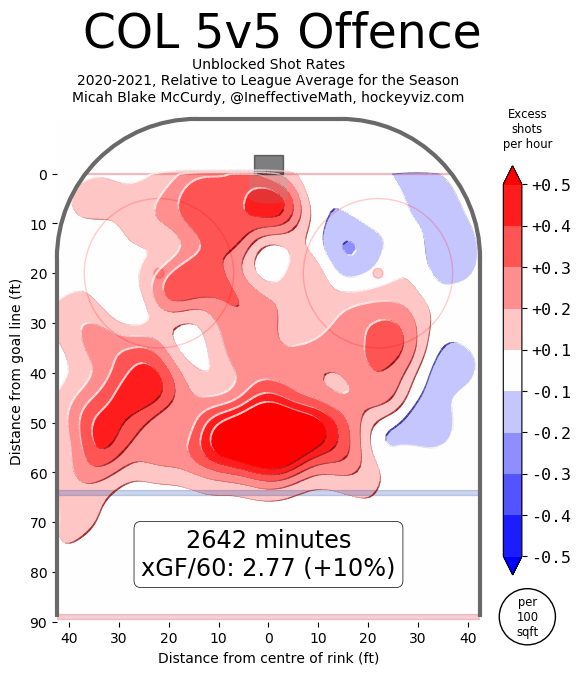
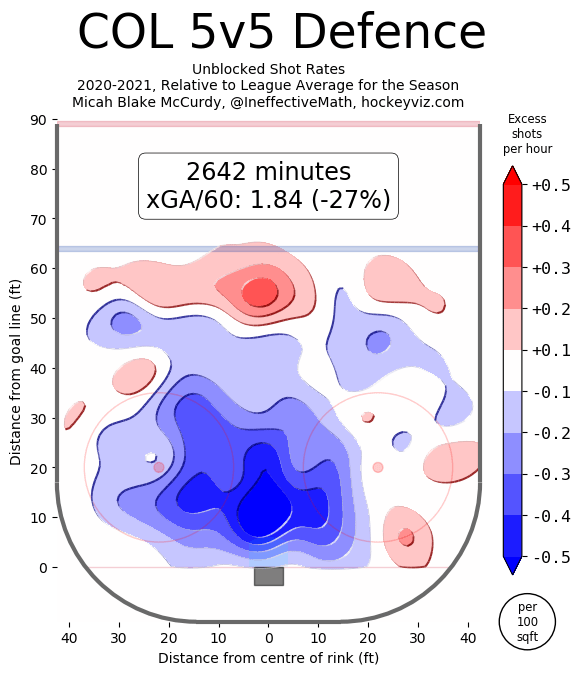
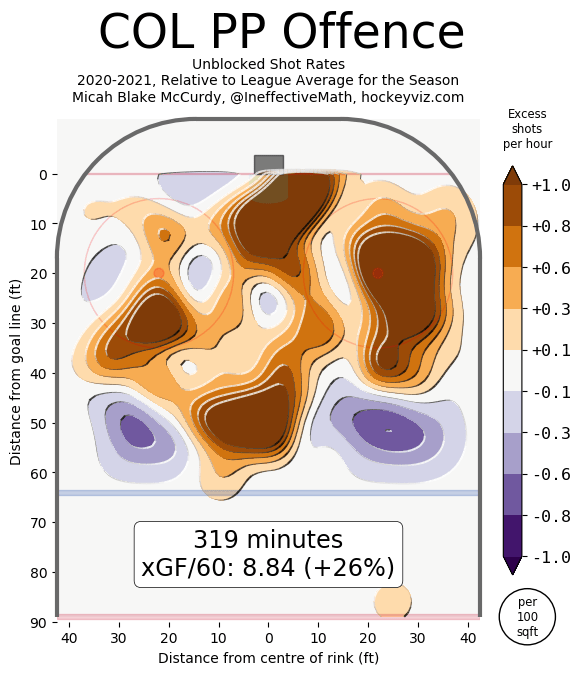
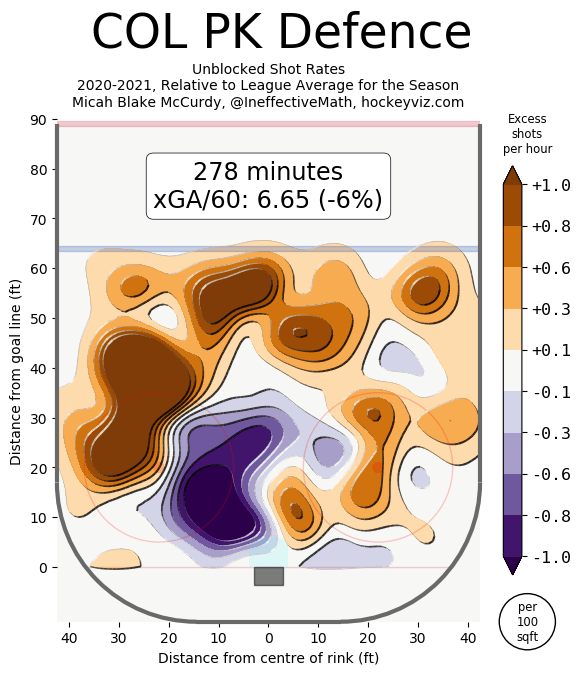
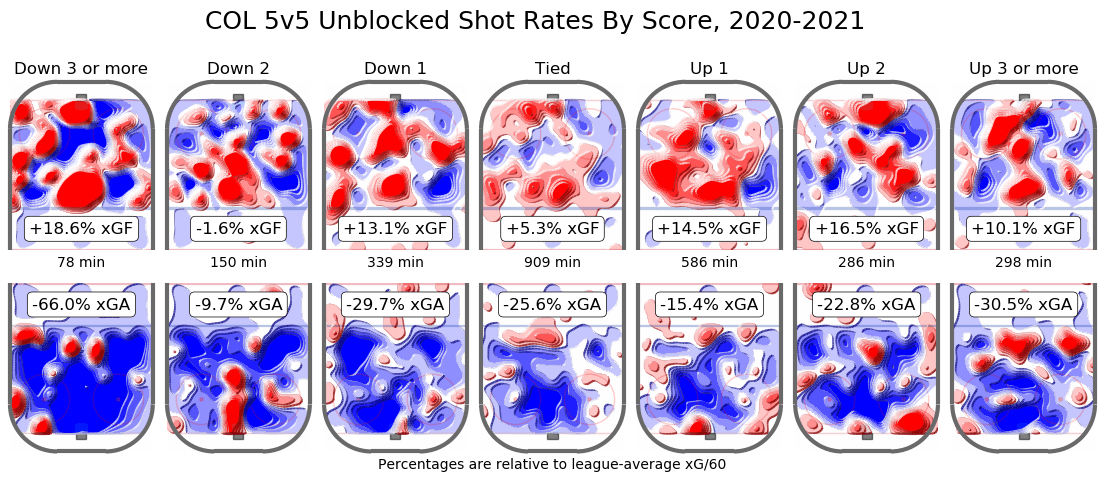
The takeaway from this is the same as it was last series: Colorado is elite at even strength with an exceptional defense, a good offense, a great power play and a strong penalty kill. Now, for Vegas.
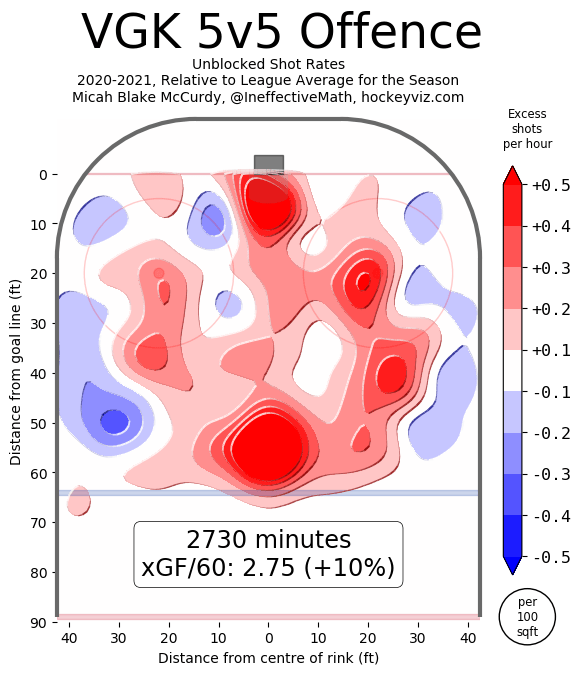
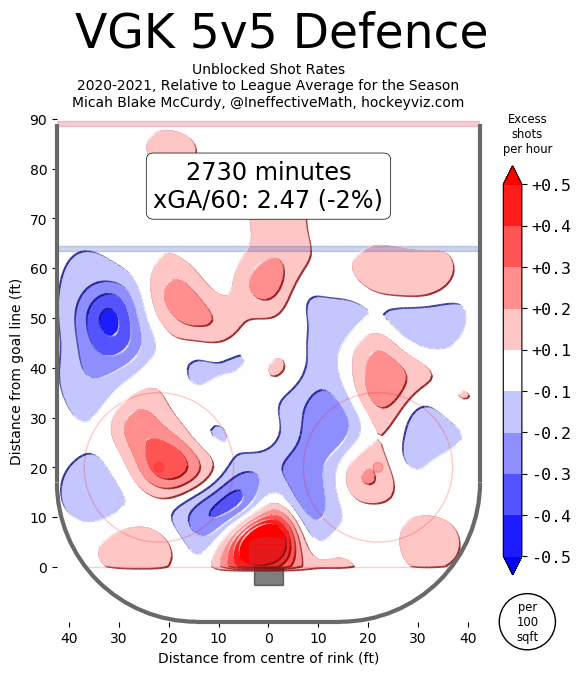
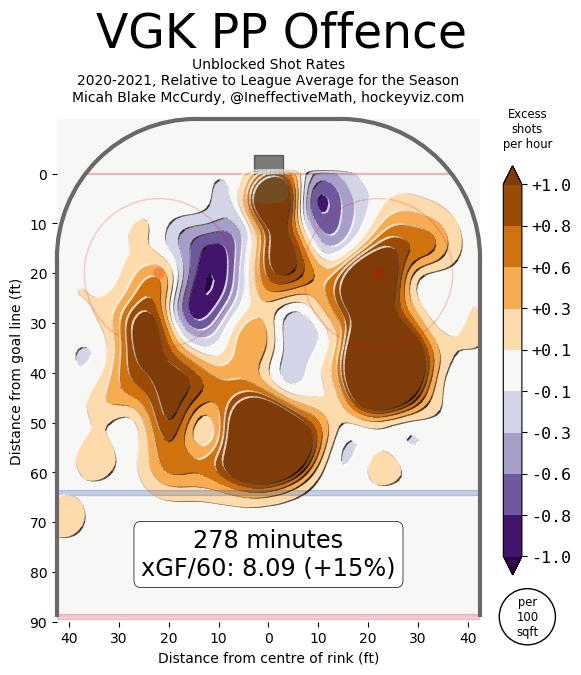
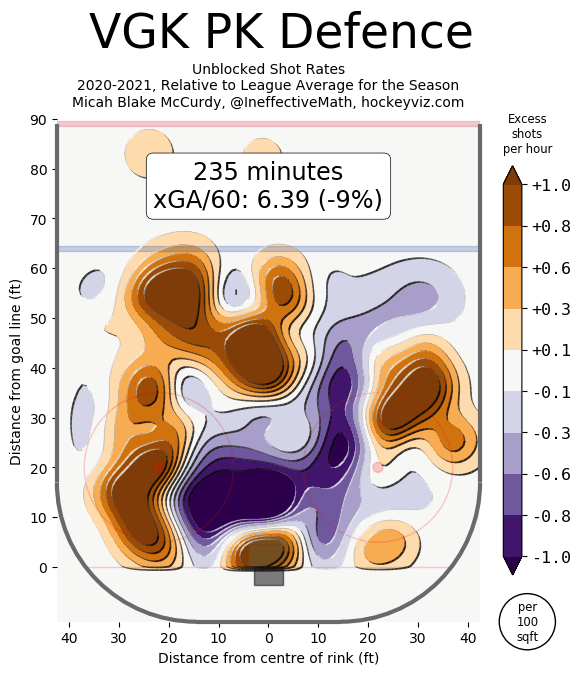
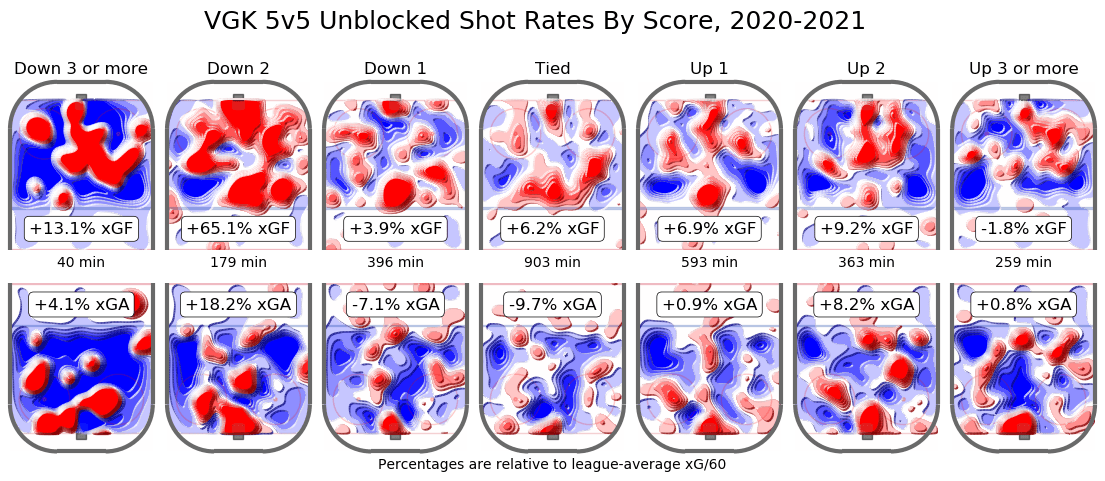
From this, we can see Vegas drives play offensively about the same as Colorado, is worse defensively but still good, has a weak power play and an exceptional penalty kill.
Overall, however, this is much closer, as expected.
The little wrinkle I added into this preview is the situational play. Vegas is good offensively in most of the situations but defensively they’re a little all over the place. That they are at their best defensively when the game is tied or they’re down by a goal is interesting and matches with their reputation as a team that can come back in any game.
I’m a little more surprised to see them being as weak defensively as they when leading, especially by just one as they’re basically league average defensively in that situation. Compare that to Colorado, who is elite defensively in every situation and elite offensively in the most common scenarios (up/down by two or less).
A lot was made near the end of this year about Colorado’s “inability” to come back in games but that was based entirely on their record when trailing after two periods. What we see here in their situational dominance matches up with what we saw during the regular season.
While the Avs won only one game when entering the third period trailing, they also were only in that situation nine times out of 56 games. If we look at their record in games in which they enter the second period trailing, they are a much better 6-7-1 on the year.
The two takeaways there are that Colorado gets behind less than almost every other team but when they do, they don’t go into the end of periods trailing very often. It’s just not something they do a lot. What’s impressive when looking at Colorado’s situational play is their numbers when leading.
Teams typically put their prevent defense into place and stop working for offense entirely and that just wasn’t the case with this Avalanche team. Even during their series against the Blues, when the Avs were protecting a lead late in the game, they managed to score goals by counterattacking hard and getting insurance. It happened repeatedly against St. Louis but will certainly be tougher to do against Vegas, who is strong when trailing.
No Ryan O’Reilly this series. Who takes Nathan MacKinnon?
With the Blues, the O’Reilly matchup was key because the entire appeal of O’Reilly as a team’s 1C is his ability to produce offense while shutting down the other team’s best player.
That…didn’t happen in the COL-STL series as MacKinnon tore O’Reilly into pieces so thoroughly that St. Louis head coach Craig Berube gave up on the matchup halfway through the series to no greater effect.
With Mark Stone, one of the league’s premier two-way forwards, you’d think Vegas would have an obvious candidate there but Vegas head coach Pete DeBoer chose to go away from that matchup most of this season.
Stone will be on a line with Chandler Stephenson and Max Pacioretty (assuming good health). This year, that line against the Avs more or less broke even, producing these numbers:
CF%: 45.64
SF%: 49.43
SCF%: 47.69
HDCF%: 50
xGF%: 49.68
That’s the best two-way line Vegas has to offer with its premier defensive winger just surviving…while avoiding the Nathan MacKinnon matchup. That’s a concern for Vegas heading into this series, although the absence of Nazem Kadri will play a major role here because he was the guy taking plenty of the minutes against this line.
The line that did play against MacKinnon, however, was the Jonathan Marchessault-William Karlsson-Reilly Smith trio. They produced all numbers below 50 in the same categories as above but were even worse head-to-head against MacKinnon specifically. Those numbers were:
CF%: 39.47
SF%: 43.24
SCF%: 37.78
HDCF%: 58.33
xGF%: 37.72
Outside of the high-danger chances, that line got caved in by MacKinnon. There isn’t an obvious candidate for the Golden Knights to put on MacKinnon like there was with O’Reilly and the Blues.
This might be a case where DeBoer might just roll with what he’s comfortable with and try keeping the Stone-Pacioretty combination away from MacKinnon. At least in that situation, Pacioretty scored a number of goals against the Avalanche this year.
Once again, this appears to be an advantage for the Avs.
Special teams matter, but how much?
This is an area where Colorado absolutely shredded the Blues in Round 1. It won’t be nearly as easy this time around.
Vegas sports the league’s top penalty kill and it showed against the Avs during the season, with Colorado scoring just once against them with the man advantage.
In fact, the Avs managed just 28 shots on goal in roughly 38 minutes on the power play and even then, 22 of those 28 came across three games. That’s five gives where they had just six shots on goal with the power play, only one of which was under two minutes of time.
It was a display of ineptitude from Colorado and reinforced why Vegas was tops in the league when killing penalties.
On the flip side, it wasn’t like the Vegas power play tore up Colorado’s penalty kill but it was certainly more effective.
That unit scored four goals in four different games and had two games with more than 10 shots on goal but also had one game where they had zero shots on goal with four minutes of power play time. That’s a wide variance in how dangerous that unit has been but the reality is that it only outscored Colorado’s PP 4-1 in eight games.
When you compare that to Colorado’s 16-14 scoring advantage at even strength, it might just be enough of an advantage in the postseason to make a difference.
Marc-Andre Fleury vs. Philipp Grubauer
This is really the biggest area where I think Vegas feels most comfortable. Even without Kadri, Colorado should feel comfortable in line matchups and with their defensive pairings.
Where the Avs are certainly going to be at a disadvantage going into the series is in goal, though it’s nowhere near the gulf some will make it out to be.
Fleury has been great this year, putting himself in the Vezina conversation and shutting out the Avalanche twice this year. Pushed by the Wild to the brink in a grueling seven-game series, Fleury stood out as a bright spot throughout as he finished the series with a sparkling .931 save percentage and 1.71 GAA.
He added a shutout against the Wild to go with a tough Game 1 loss where Fleury gave up the game’s only goal in overtime on a funky deflection off a teammate in front of him.
As a three-time winner of the Stanley Cup and a guy whose play has gotten better with age, Fleury sports the reputation as one of the game’s elite and it’s tough to mount much of an argument these days. He has the moxie and track record of a guy who accomplished just about everything a goaltender could want in a career and is having arguably his best season to date.
He’s the man in the Vegas net…unless they want to turn to the guy they signed this last offseason to a five-year deal after he was the man in net for last year’s playoff run to the Western Conference Finals, Robin Lehner.
If Fleury falters at all, Lehner can slide in and give them high-end goaltending, too, an advantage that exists basically only with Vegas and the Islanders.
On the end of the ice is the man people refuse to believe in, Philipp Grubauer. Even with Fleury’s spectacular numbers in the first round, guess who he sits behind in save percentage?
Mama, there goes that man again.
It’s Grubauer, who polished off the Blues in four games with a sparkling 1.75 GAA and .926 save percentage. While his workload wasn’t the stuff of legends (27.5 shots per game faced), it was more than it was in the regular season (24.825 shots per game faced).
Grubauer is also staring down a legacy-defining moment in his career. With Fleury on the backside of his career and trying to win another ring, Grubauer is trying to prove at age 31 that Colorado was right to gamble on him three years ago in a trade with Washington.
He’s also entering free agency and all you have to do is look at Jordan Binnington’s bloated six-year contract to see exactly how the league values goaltenders who backstop Cup-winning teams. This is his chance to cash in huge.
If he’s at his best, Colorado can go toe-to-toe with Fleury and Vegas. The pressure is on Grubauer, however, because he’s the guy still be doubted at the start of every playoff series and listed as Colorado’s biggest question mark by people outside Colorado.
Here’s another chance for him to take a step towards forever silencing the critics.
Infirmary Report
Nobody knows better than Avalanche fans the importance of being on the right side of the health coin flip in a series. After watching their lineup get decimated by injury last year, the Avs opened this postseason with their opponent never having their leading scorer and subsequently losing two of their regulars on defense to injury as the series carried on.
Dallas didn’t apologize for Colorado’s misfortune last year and the Avs certainly didn’t think twice about the Blues’ problems.
Coming into this series, the Avs are actually getting healthier as Bowen Byram is 100% and ready to go whenever Jared Bednar decides to use him (my guess is Byram comes in after the team’s first loss in the series or as an injury replacement). On a more surprising note, Logan O’Connor is back on the ice and could be an option for the Avs in this series, which could give a jolt of life to a fourth line that could certainly use his speed and physicality, let alone his PK responsibilities.
On the other side, there are a few more questions. Brayden McNabb tested positive for COVID and is on the league’s COVID Protocol List for the foreseeable future and is likely to miss multiple games.
While Max Pacioretty played in Game 7 against Minnesota, it sounds like he’s not close to fully healthy and is just gutting it out because the team needs him out there. He’s the leading goal scorer for Vegas so if he can’t be an impact player, that’s going to tilt things to Colorado’s side.
The real question mark of this series beyond Pacioretty is the availability of Kadri. His suspension appeal was already heard and everyone is just waiting for a ruling from Gary Bettman.
If the suspension isn’t reduced, Kadri’s return would be in Game 7 of this series at the earliest. That sets up for a tremendous redemption arc for the much-maligned Kadri but the Avs would certainly love to see him back in the lineup before then. We’ll see how that story develops but the outcome of Kadri’s appeal could be a tide-turning factor in this series.
In the end…
Here’s the rub. These were the two best teams in the regular season. That was aided by a horrible division but it is what it is. These two teams kicked a lot of ass this year.
They’re both good offensively, with Colorado tilting closer to elite than Vegas, and both are great defensively, with Colorado tilting closer to elite than Vegas. Goaltending has been tip-top for the Golden Knights all year and the Avs are completely reliant on Grubauer.
It all sets up as the matchup everyone in the hockey world wanted to see for a reason. These are clearly the two best teams from the West Division this year and could be starting a rivalry that dominates the Western Conference for the next few years.
If Colorado wants to prove it can live up to its lofty billing, this is the time. It’s now. This series. No excuses. No nonsense. Time to prove it.
Comments
Share your thoughts
Join the conversation



